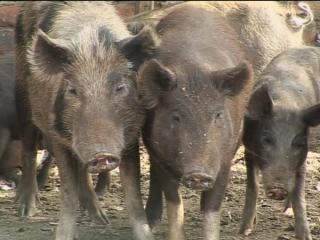- အျခား ႏိုင္ငံအခ်ဳိ႕တြင္လည္း ေရာဂါျဖစ္ပြားသူမ်ား ေတြ႔လာေနရသည္။ ကမၻာ့က်န္းမာေရး အဖြဲ႔ၾကီးက ဤေရာဂါႏွင့္ ပတ္သက္၍ အဆင့္ ၄ အဆင့္ဟု ေၾကညာထားရာ လူမွ လူသို႔ ကူးစက္မႈ ျဖစ္ပြားႏိုင္ၿပီး လူမႈ အဖြဲ႔အစည္းအတြင္း ကပ္ေဘးအႏၲရာယ္ ျဖစ္လာႏိုင္သည္ဟု ဆိုျခင္းျဖစ္သည္။
ဝက္တုပ္ေကြး၏ လကၡဏာမ်ား
- ကိုယ္ပူျခင္း၊ ႏွာရည္ယိုျခင္း၊ ႏွာေစးေခ်ာင္းဆိုးျခင္း၊ ကိုယ္လက္ မအီမသာျဖစ္၍ ကိုက္ခဲျခင္း၊ ေခါင္းကိုက္ျခင္း၊ ပင္ပန္းႏြမ္းနယ္ျခင္း၊ အသက္ရႉၾကပ္ျခင္းတို႔ ျဖစ္သည္။
ေရွာင္ရန္
အထက္ပါ ေရာဂါလကၡဏာျဖစ္လွ်င္ မိမိေနအိမ္တြင္သာ အနားယူရန္၊ လိုအပ္လွ်င္ ေဆး႐ံု၊ ေဆးခန္းသို႔ ျပသ၍ ကုသမႈခံယူရန္၊ အဖ်ားၾကီးျခင္း၊ ေခ်ာင္းဆိုးၾကာရွည္ျခင္း၊ အသက္ရႉ ခက္ခဲ၍ ေမာပန္းျခင္း စသည့္ ျပင္းထန္ေသာ ေရာဂါလကၡဏာမ်ား ခံစားရလွ်င္ ေဆး႐ံု၊ ေဆးခန္းသို႔ ျပသရန္ လိုအပ္သည္။
လူတိုင္းလုိက္နာ ေဆာင္ရြက္သင့္သည္မွာ -
(၁) ႏွာေခ် ေခ်ာင္းဆိုးလွ်င္ လက္ကိုင္ပုဝါျဖင့္ ဖံုးအုပ္ျခင္း
(၂) လက္ကို ဆပ္ျပာျဖင့္ စင္ၾကယ္စြာ ေဆးေၾကာျခင္း
(၃) တကိုယ္ေရသန္႔ရွင္းမႈ ဂ႐ုျပဳ ေဆာင္ရြက္ျခင္း
(၄) ေကာင္းစြာ အိပ္စက္အနားယူျခင္း
(၅) အာဟာရ ျပည့္ဝသည့္ အစားအစာမ်ား စားသံုးျခင္း
(၆) ကိုယ္လက္လႈပ္ရွားမႈ မွန္မွန္ ျပဳလုပ္ျခင္း
(၇) ေလေကာင္းေလသန္႔ ရရွိေအာင္ ေဆာင္ရြက္ေနထိုင္ျခင္း
တုပ္ေကြးေရာဂါ ျဖစ္ပြားသည္ဟု သံသယရွိသူမ်ားႏွင့္ ျပဳစုေစာင့္ေရွာက္သူမ်ားသည္ ႏွာေခါင္းစည္းမ်ား တပ္ဆင္ရန္ လိုအပ္သည္။
ဝက္ေမြးျမဴသူမ်ား၊ ေရာင္းဝယ္သူမ်ားႏွင့္ စားသံုးသူမ်ား လိုက္နာရန္
(၁) ဝက္မ်ား၌ ဖ်ားနာသည့္ လကၡဏာမ်ား ေတြ႔ရွိပါက လူႏွင့္ တိုက္႐ိုက္ မထိေစဘဲ လူႏွင့္ အနီးနား၌ မထားဘဲ သီးျခားထားရွိရန္
(၂) ဝက္ၿခံလုပ္ငန္း ေဆာင္ရြက္ၿပီးတိုင္း ေျခ၊ လက္မ်ား စနစ္တက် စင္ၾကယ္စြာ ေဆးေၾကာရန္
(၃) ႏွာေခါင္း၊ ပါးစပ္အကာ လက္အိတ္မ်ား အသံုးျပဳကိုင္တြယ္သြားရန္
(၄) မက်န္းမာေသာ ဝက္မ်ားအား ေစ်းကြက္သို႔ ေရာင္းခ်ျခင္း မျပဳရန္
(၅) မူရင္းဇစ္ျမစ္မသိေသာ ဝက္မ်ားကို ေရာင္းခ်ျခင္း မျပဳရန္၊ အထူးသျဖင့္ နယ္စပ္ျဖတ္ေက်ာ္၍ ဝင္ေရာက္လာေသာ ဝက္မ်ားကို ဝယ္ယူေရာင္းခ်ျခင္း မျပဳရန္
(၆) ဝက္သားႏွင့္ ဝက္သားထြက္ ပစၥည္းမ်ားကို ခ်က္ျပဳတ္စားေသာက္လိုလွ်င္ အပူခ်ိန္ ၇ဝံ င အထက္ ခ်က္ျပဳတ္စားေသာက္ရန္
______________________________
ကမၻာ့ႏိုင္ငံမ်ားသို ့ ျပန္ ့ႏွံ ့ႏိုင္တဲ့ စိုးရိမ္ဖြယ္ ၀က္တုပ္ေကြးေရာဂါ
(Swine Flu) အေႀကာင္း သိရွိေစရန္ ေဖၚျပအပ္ပါတယ္။
Swine Flu ဆိုတာ ဘာလည္း။
Swine Flu ဟာ ၀က္ေတြမွာျဖစ္တဲ့ Influenza ဗိုင္းရပ္စ္အမ်ဳိးအစား A H1N1 virus
အမ်ဳိးအစားေႀကာင့္ျဖစ္တဲ့ အသက္ရွဴလမ္းေႀကာင္းပိုင္းဆိုင္
ရာေရာဂါ ျဖစ္ပါတယ္။
လူေတြအေနနဲ ့ ၀က္ေတြကေန တိုက္ရိုက္ကူးစက္ဖို ့ခဲယွဥ္းေပမယ့္
ဒီေရာဂါပိုးရထားတဲ့သူကေနတစ္ဆင့္ အျခားသူတစ္ဦးကို ကူးစက္ႏိုင္ပါတယ္။
Swine Flu ျဖစ္ရင္ ဘယ္လို ေရာဂါလကၡဏာေတြ ေတြ ့ျမင္ရႏိုင္ပါသလည္း။
Swine Flu ျဖစ္တဲ့သူမွာ အပူခ်ိန္အဖ်ားတက္ျခင္း၊ ေခ်ာင္းဆိုးျခင္း၊
လည္ေခ်ာင္းနာျခင္း၊ ခႏၵာကိုယ္ကိုက္ခဲျခင္း၊ ေခါင္းကိုက္ျခင္း၊ ခ်မ္းတုန္းျခင္း၊
ေမာပန္းျခင္းတို ့ ျဖစ္ေလ့ရွိပါတယ္။ အခ်ဳိ ့ေသာသူေတြမွာ ၀မ္းေလွ်ာျခင္း၊
အန္ျခင္းတို ့လည္း ျဖစ္တတ္ပါတယ္။ စိုးရိမ္ဖို ့အေနနဲ ့ကေတာ့ အဆုတ္ေရာင္ျခင္းနဲ
့ အသက္ရွဴလမ္းေႀကာင္းပိတ္ဆို ့ျပီး အသက္ဆုံးရွဳံးႏိုင္ပါတယ္။
Swine Flu ဟာ ကူးစက္ေရာဂါ ျဖစ္ပါသလား။
Swine Flu ဟာ လူတစ္ဦးကေနတစ္ဦးထံ ကူးစက္ႏိုင္ပါတယ္။ အထူးသျဖင့္
ေခ်ာင္းဆိုးျခင္းႏွင့္ ႏွာေခ်ျခင္းမွ ကူးစက္ႏိုင္ပါတယ္။ ထို ့အျပင္ Swine Flu
ေရာဂါရရွိထားသူ၏ ႏွာေခါင္း၊ ပါးစပ္၊ ႏွာေခါင္းနဲ ့ တံေထြးမ်ားမွာ Swine Flu
ဗိုင္းရပ္စ္ပိုး တြယ္ကပ္ေနႏိုင္တာေႀကာင့္ အဆိုပါေနရာမ်ားကို ထိေတြ ့မိပါကလည္း
ကူးစက္ႏိုင္ပါတယ္။
Swine Flu ကို ဘယ္လိုကာကြယ္တားဆီးမလည္း။
ကာကြယ္တားဆီရန္ ႀကဳိတင္ျပဳလုပ္ထားသင့္သည္မ်ားမွ
မ၀င္ေရာက္ေစရန္ ႏွာေခါင္းနဲ ့ ပါးစပ္အား ကာကြယ္ထားေပးေသာ ပါးစပ္ဖုံး
ႏွာေခါင္းအုပ္မ်ားအား ၀တ္ဆင္ထားသင့္ပါတယ္။ လက္အား တစ္ခုခုကိုင္တြယ္ျပီးပါက
မႀကာခဏ ဆပ္ျပာျဖင့္ ေဆးေႀကာသန္ ့ရွင္းရပါမယ္။ ကိုယ္ခႏၶာက်န္းမာေရး
အားေကာင္းျပည့္စုံေနေစရန္ ဂရုစိုက္ဖို ့လိုပါတယ္။ အိပ္စက္အနားယူခ်ိန္
ျပည့္ျပည့္၀၀ရရန္ လိုပါတယ္။ စိတ္ဓါတ္က်ဆင္းမွဳနဲ ့ အားနည္းေစမွဳမ်ားကို
ေရွာင္ရွားရန္ လိုပါတယ္။ ေရ ၀၀လင္လင္ ေသာက္သုံးရန္ လိုပါတယ္။ အာဟာရျပည့္စုံေသာ
အစားအေသာက္မ်ား စားသုံးရန္ လိုအပ္ပါတယ္။
Swine Flu ရရွိထားသူ ေနမေကာင္းသူမ်ားအေနနဲ ့ လိုက္နာသင့္တာေတြက ဘာပါလည္း။
မိမိထံမွ Swine Flu ဗိုင္းရပ္စ္ပိုး အျခားသူထံ မကူးစက္ေစရန္ ကာကြယ္မွဳ
ျပဳလုပ္ေပးသင့္ပါတယ္။ မိမိေခ်ာင္းဆိုး ႏွာေခ်တဲ့အခါမွာ လက္ကိုင္ပု၀ါသန္ ့သန္ ့
(သို ့) စကၠဴတစ္ရွဴးမ်ားနဲ ့ ကာကြယ္ျပီးမွ ေခ်ာင္းဆိုးသင့္ ႏွာေခ်သင့္ပါတယ္။
မိမိရဲ ့ မ်က္စိ ႏွာေခါင္း ပါးစပ္တို ့ကို ေရာဂါပိုး ကပ္တြယ္ေနႏိုင္ေသာ
လက္ျဖင့္ ကိုင္တြယ္ျခင္း မျပဳလုပ္သင့္ပါဖူး။ မိမိရဲ ့ လက္ကို မႀကာခဏ
ဆပ္ျပာျဖင့္ ေဆးေႀကာသန္ ့စင္ရပါမယ္။ မိမိ ေခ်ာင္းဆိုး ႏွာေျခရာတြင္ သုံးေသာ
စြန္ ့ပစ္ပစၥည္းမ်ားကို စနစ္တက် သိမ္းဆည္းသင့္ပါတယ္။ မိမိ ေနထိုင္မေကာင္းပါက
လူအမ်ားရွိေသာ ေနရာမ်ား ျဖစ္တဲ ့ေစ်း၊ ေက်ာင္း အလုပ္တို ့ကို သြားေရာက္ျခင္းမွ
ေရွာင္သင့္ပါတယ္။
ဒီ Swine Flu ျဖစ္သူမ်ားအေနနဲ ့ ဘယ္လို အေျခအေနမ်ဳိးမွာ ဆရာ၀န္ႏွင့္ အျမန္ေတြ
့သင့္ပါသလည္း။
Swine Flu ေႀကာင့္ ေနမေကာင္းျဖစ္ျပီဆိုကတည္းက ဆရာ၀န္မ်ား၏ ကုသမွဳကို
ခံယူသင့္ပါတယ္။ အေရးေပၚအေနနဲ ့ ေအာက္ေဖၚျပပါ လကၡဏာမ်ားကို ေတြ ့ရွိရပါက
လ်င္ျမန္စြာ ေဆးရုံေဆးခန္းမ်ားသို ့ သြားသင့္ပါတယ္။
- အထူးသျဖင့္ Swine flu ျဖစ္ေနသူ ကေလးမ်ားအေနနဲ ့ အသက္ရွဴႏွဳန္း
အလြန္ျပင္းထန္လာျခင္း၊ အသက္ရွဴခက္ခဲျခင္း၊ အသားအေရ ျပာေယာင္သမ္းလာျခင္း၊
ေရလုံး၀ မေသာက္ျခင္း၊ အိပ္ေမာက်ေနကာ ႏိုး၍လွဳပ္၍ မရျခင္း၊
ေခ်ာင္းတအားဆိုးျခင္းႏွင့္ ကိုယ္ပူခ်ိန္အဖ်ားႀကီးျခင္း။
- Swine flu ျဖစ္ေနသူ လူႀကီးမ်ားအေနျဖင့္ အသက္ရွဴခက္ခဲျခင္း၊ အသက္ရွဴရာတြင္
နာက်င္ျခင္း၊ ရင္ဘတ္ႏွင့္ ၀မ္းဗိုက္တြင္ နာက်င္ျခင္း၊ ရုတ္တရက္ မူးေ၀ျခင္း၊
အျမင္ေ၀၀ါးျခင္း၊ အဆက္မျပတ္အန္ျခင္းတို ့ ျဖစ္ပါက ေဆးရုံေဆးခန္းသို ့
အျမန္သြားေရာက္ ျပသသင့္ပါတယ္။
Swine Flu ကို ၀က္သားစားျခင္းႏွင့္ ၀က္မွ ထုတ္လုပ္ေသာ အစားအေသာက္မ်ားေႀကာင့္
ကူးစက္ႏိုင္ပါသလား။
၀က္သားအပါအ၀င္ မည္သည့္အစားအေသာက္ကမွ Swine flu မကူးစက္ႏိုင္ပါ။ သို ့ေသာ္ Swine
flu ျဖစ္ေနေသာ ၀က္မ်ားအား ထိေတြ ့ကိုင္တြယ္ျခင္းကိုမူ ေရွာင္ရွားရပါမည္။
Swine Flu ျဖစ္ရင္ မည္သည့္ေဆး၀ါးသုံးစြဲသင့္ပါသလည္
အေမရိကန္ျပည္ေထာင္စု ကူးစက္ေရာဂါျပန္ ့ပြားမွဳထိန္းခ်ဴပ္ေရးဌာနမွ
ကြ်မ္းက်င္သူဆရာ၀န္မ်ားကေျပာတာ
ကာကြယ္ကုသဖို ့အတြက္ အသုံးျပဳႏိုင္တယ္လို ့ မွတ္ခ်က္ေပးပါတယ္။
Swine Flu ျဖစ္တဲ့ ေနာက္ဆုံးအေျခအေန ဘယ္လိုရွိပါသလည္း။
ဒီ Swine Flu ေရာဂါျဖစ္ပြားသူ - အေမရိကန္ျပည္ေထာင္စုမွာ မေန ့ကထိ စုစုေပါင္း
(အေယာက္ ၂၀)၊ ကေနဒါမွာ (၆) ေယာက္၊ မက္ဆီကိုမွာ အေယာက္ (၁၃၈၄) ဦး - ေသဆုံးသူ
(၈၁) ဦးတို ့ျဖစ္ျပီး၊ ေရာဂါသံသယရွိဖြယ္ေတြ ့ရွိမွွဳမွာ ျပင္သစ္မွာ (၁) ဦး၊
အစၥေရးမွာ (၁) ဦး၊ နယူးဇီလန္မွာ (၁၀) ဦး၊ စပိန္မွာ (၇) ဦးတို ့ျဖစ္ပါတယ္။
______________________________
Swine တုပ္ေကြး ဥေရာပတိုက္သို႔ပါ ျပန္႔နွံ႔လာ
Views : 332
Favoured : 2
ဝက္မ်ားတြင္သာ ျဖစ္ပြားတတ္ေသာ Swine တုပ္ေကြးတစ္မ်ဳိးသည္ လူမ်ားကိုပါ ကူးစက္လ်က္ရိွရာ အဓိကျဖစ္ပြားသည့္ မကၠဆီကိုႏိုင္ငံတြင္ ေသဆံုးသူ ၁၀၃ ေယာက္ထက္မနည္း ရိွလာေနၿပီး အေမရိကန္၊ ကေနဒါတို႔တြင္သာမက တိုက္ခ်င္းျခားလ်က္ရိွေသာ ဥေရာပတိုက္ စပိန္ႏိုင္ငံတြင္ပါ ျဖစ္ပြားလာေနသည္ဟု သတင္းမ်ားအရ သိရသည္။
မကၠဆီကို ႏိုင္ငံႏွင့္ အေမရိကတုိက္တြင္ ျဖစ္ပြားေနေသာ Swine တုပ္ေကြးေရာဂါ ခံစားေနရသူတစ္ဦးကို စပိန္ႏိုင္ငံတြင္ ေတြ႔ရိွခဲ့ၿပီးေနာက္ ဥေရာပႏွင့္ အာရွေဒသမ်ားအတြက္ပါ စိုးရိမ္စရာျဖစ္လာခဲ့ၿပီး သက္ဆိုင္ရာ အစိုးရမ်ားႏွင့္ အဖြဲ႔အစည္းမ်ားက ၾကိဳတင္ကာကြယ္မႈမ်ား ျပဳလုပ္ၾကရန္ ႏႈိးေဆာ္လ်က္ရိွသည္။ Swine တုပ္ေကြးေၾကာင့္ မကၠဆီကို တစ္ႏိုင္ငံတည္းတြင္ ေသဆံုးသူ ၁၀၃ ဦးရိွၿပီျဖစ္ၿပီး သံသယရိွဖြယ္ရာ ဖ်ားနာေနသူ ၁၆၀၄ ဦးရိွသည္ဟု မကၠဆီကို က်န္းမာေရးဌာနက သတင္းထုတ္ျပန္သည္။ အေမရိကန္ႏိုင္ငံ၏ ျပည္နယ္ ၅ ခုတြင္လည္း ေရာဂါျဖစ္ပြားေနသူ ၂၀ ဦးရိွသည္ဟု ေရာဂါထိန္းခ်ဳပ္ေရးအဖြဲ႔က ေၾကညာခဲ့ျပီး ကေနဒါႏိုင္ငံတြင္ ၆ ဦးရိွသည္ဟု သိရသည္။ စပိန္ႏိုင္ငံတြင္ ေတြ႔ရိွရသည့္ ေရာဂါကူးစက္ခံ အမ်ဳိးသားမွာ မကၠဆီကိုမွ ျပန္လာသူျဖစ္သည္ဟု ဆိုသည္။
ဥေရာပသမဂၢက ဥေရာပ က်န္းမာေရးဝန္ၾကီးမ်ား အေရးေပၚ အစည္းအေဝးဆင့္ေခၚခဲ့ၿပီး ေရာဂါကူးစက္လာမႈ တားဆီးရန္ ေဆြးေႏြးမႈမ်ား အပူတျပင္း ျပဳလုပ္ခဲ့ၾကသည္။ အေမရိကန္ သမၼတ အိုဘားမားကလည္း အခ်ိန္မဆိုင္းဘဲ အထိေရာက္ဆံုး ကာကြယ္ကုသသြားရန္ တိုက္တြန္းလိုက္သည္။ အေမရိကန္တြင္ တနဂၤေႏြေန႔ကတည္းက က်န္းမာေရး အေရးေပၚ အေျခအေနအျဖစ္ ေၾကညာထားၿပီးျဖစ္သည္။ ကမာၻ႔က်န္းမာေရးအဖြဲ႔ၾကီး (W.H.O) ကလည္း ကမာၻအႏွံ႔ျပန္႔ႏွံ႔ ထိခိုက္ႏိုင္သည့္ တုပ္ေကြးအျဖစ္ အထူးသတိေပးလ်က္ရိွသည္။ မကၠဆီကိုႏိုင္ငံတြင္ ေရာဂါကူးစက္မႈအတြက္ လူထူထပ္ေသာ ေနရာမ်ားကို ေရွာင္ၾကဥ္ၾကရန္ သတိေပးၿပီးေနာက္ လမ္းမမ်ားတြင္ ေျခာက္ကပ္လ်က္ရိွသည္။ မကၠဆီကိုတြင္ တနဂၤေႏြက က်င္းပသြားေသာ ေဘာလံုးပြဲကိုလည္း ပရိသတ္ၾကည့္ခြင့္ မေပးခဲ့ဘဲ ကြင္းပိတ္ကစားသြားခဲ့သည္။ ထိုင္း၊ အင္ဒိုနီးရွား၊ တရုတ္ႏွင့္ ရုရွားႏိုင္ငံတို႔က မကၠဆီကို၊ အေမရိကန္ႏွင့္ အေမရိကႏိုင္ငံမ်ားမွ ဝက္သားမ်ား တင္သြင္းျခင္းကို ယာယီပိတ္ပင္ထားလိုက္သည္။ ထိုႏိုင္ငံမ်ားမွ ျပန္လာသူမ်ားကိုလည္း ေလဆိပ္တြင္ က်န္းမာေရးစစ္ေဆးျခင္းကို ကမာၻ႔ႏိုင္ငံ အမ်ားအျပားတြင္ ျပဳလုပ္လ်က္ရိွသည္။ ေရာဂါကူးစက္လ်က္ရိွေသာ ႏိုင္ငံမ်ားႏွင့္ နီးစပ္ရာႏိုင္ငံမ်ားတြင္ လမ္းသြားပါက ပါးစပ္ႏွင့္ ႏွာေခါင္းကို ကာကြယ္သည့္ မ်က္ႏွာဖံုးမ်ား တပ္ဆင္ၾကရန္ သတိေပးထားသည္။ ဖိလစ္ပိုင္ႏိုင္ငံတြင္ ျပည္သူမ်ားကို အခ်င္းခ်င္း ဖက္ျခင္း၊ နမ္းရႈံ႕ျခင္း မျပဳလုပ္ၾကရန္ သတိေပးထားသည္ဟု ေဒသဆိုင္ရာ AFP သတင္းတစ္ပုဒ္တြင္ ပါရိွသည္။
Swine တုပ္ေကြးသည္ မတ္လမွ စတင္၍ မကၠဆီကို ႏိုင္ငံတြင္ ျဖစ္ပြားေနခဲ့ကာ လူမ်ားကို ကူးစက္လ်က္ရိွၿပီး လ်င္ျမန္စြာ ျပန္႔ပြားေနေၾကာင္း ယခုလ ၂၃ ရက္ေန႔တြင္ ေၾကညာခဲ့သည္။ ေရာဂါခံစားရသူသည္ အဖ်ားၾကီးျခင္း၊ ေခ်ာင္းဆိုးျခင္း၊ ေခါင္းမူးေခါင္းကိုက္ျခင္းမ်ား ခံစားရသည္ဟု သိရသည္။ အဆိုပါတုပ္ေကြးသည္ ေခ်ာင္းဆိုးျခင္း၊ ႏွာေခ်ျခင္းမ်ားမွ တဆင့္ ကူးစက္ႏိုင္သည္။
(ေရာဂါလကၡဏာမ်ားကို http://upload.wikimedia.org/



























